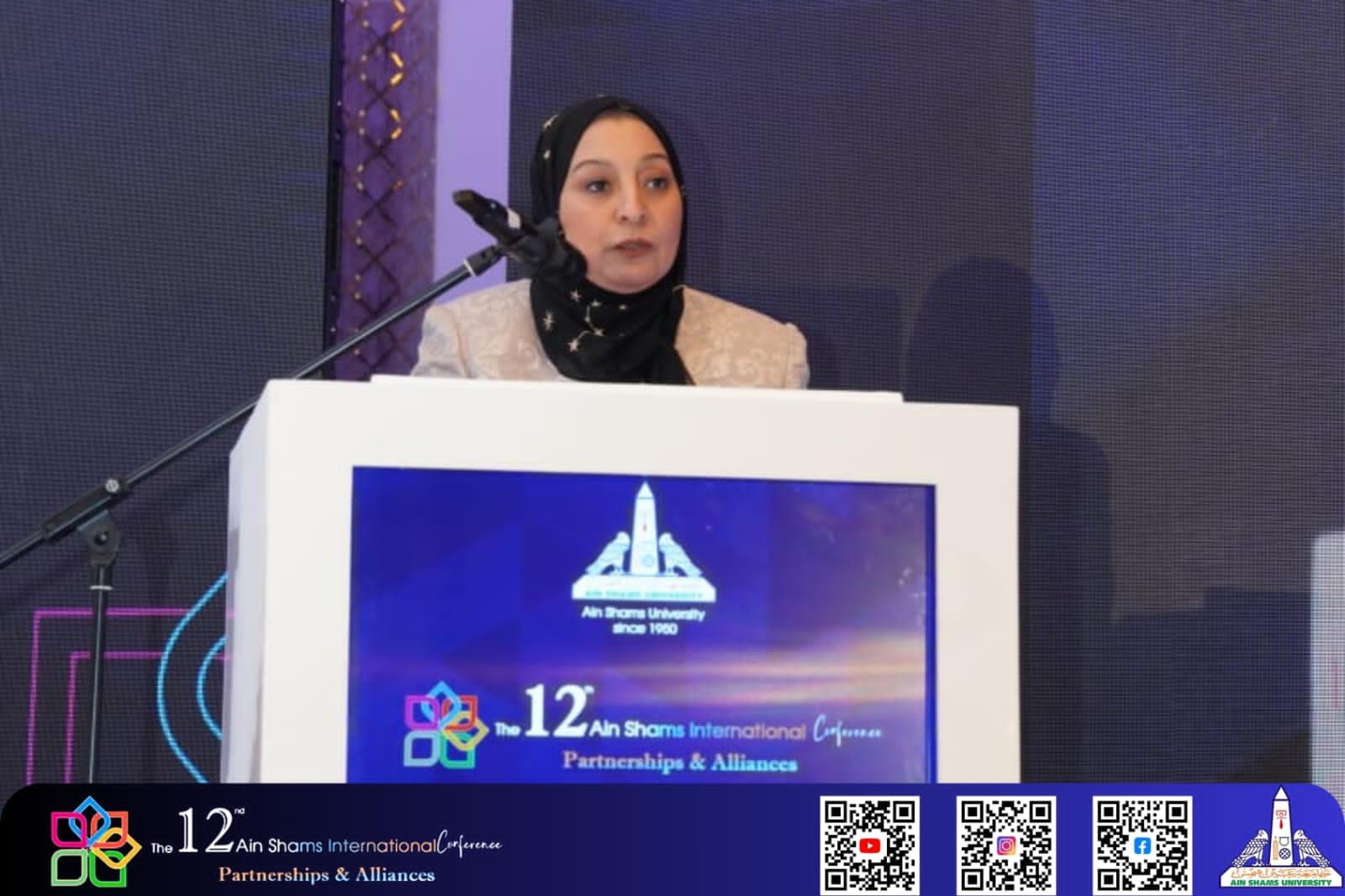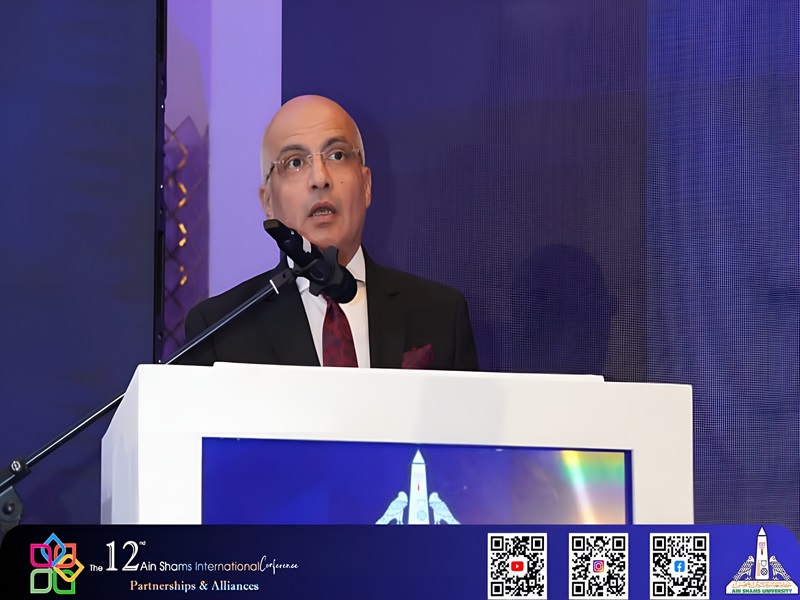The conclusion and recommendations of the twelfth Ain Shams University conference “Alliance and Partnerships”
Prof. Mohamed Diaa Zain El Abedeen, President of Ain Shams University, confirmed that the university conference achieved its main goal of enhancing cooperation between the various sectors of the university and opening new horizons for cooperation between the university and various national, regional and international bodies in the fields of scientific research, education, community service, and supporting sustainable development projects and major national projects in Egypt. This was during the speech was delivered by His Excellency at the conclusion of the university’s twelfth scientific conference, “Alliance and Partnerships.”
In the presence of Prof. Muhammad Awad Taj El-Din, Advisor to the President of the Republic for Health and Prevention Affairs, Prof. Mahmoud El-Meteini, former university president, Prof. Ahmed Zaki Badr, former Minister of Local Development, Prof. Amr Ezzat Salama, Secretary General of the Association of Arab Universities, Prof. Mustafa Refaat, Secretary General of the Supreme Council of Universities.
His Excellency added that the conference sessions witnessed, over two days, a fruitful scientific dialogue and constructive interaction between an elite group of scientists and specialists from various fields from Egypt and abroad, hoping that the results of this scientific gathering would be an incentive to launch new initiatives and a solid ground for achieving more partnerships in order to achieve a better future for Ain Shams University, our society, and for our dear homeland, Egypt.
In her speech, Prof. Ghada Farouk, Vice President of the University for Community Service and Environmental Development and Acting Vice President for Graduate Studies and Research, said that the conference’s sessions and activities witnessed many fruitful discussions that contribute to strengthening bridges of cooperation with our partners at the local and international levels.

It also announced the conference's recommendations in its multiple sessions, which included:
In the field of building and developing the capabilities of students and graduates in the fields of applied scientific research, employment, innovation and entrepreneurship, the sessions recommended:
- Focusing on the importance of building alliances between universities and business organizations at home and abroad so that universities become the research arm of those organizations.
- Relying on evaluating international partnerships and alliances in light of students’ employability and ease of integration into the labor market, and focusing on intensifying various employment initiatives, programs and events that help provide students and graduates with the necessary skills to keep pace with rapid developments locally and globally.
- Strengthening partnerships with the private sector in all various activities, events and initiatives, which contribute to providing training and employment opportunities and cooperating in providing learning activities through experience in different ways for students and graduates.
- Create joint research and development projects that enable students and faculty staff to work on real-world problems alongside industry professionals by promoting innovation and entrepreneurial thinking in students through hackathons, business incubators, and startup support programs.
As for the medical and nursing sectors, the sessions recommended:
- Moving towards more international partnerships and alliances in the field of joint research and innovative research in medicine and nursing in general, cardiothoracic surgery, hematology, and bone marrow transplantation for children in particular.
- Including nursing care for patients with blood diseases, marrow transplantation, and cardiac and pulmonary perfusion within the teaching curricula for the undergraduate and postgraduate levels in light of students’ employability and ease of entering the labor market.
- Calling on health institutions and civil society organizations to ally with universities to support the health system and educate society about the role of university hospitals in preserving the health of the Egyptian citizen.
The recommendations of Industrial Partnership Session:
Promote the exchange of expertise between university researchers and various industrial sectors.
Strengthen the partnership between the university, manufacturing entities, and production institutions by activating industrial cooperation protocols and joint research projects to solve problems and meet the needs of the Egyptian market.
Maximize the utilization of the scientific research outputs of the faculties and disseminate the culture of marketing them to the community through partnership and cooperation with relevant organizations in the fields of industry to find the best opportunities for their application.
Focus on the participation of students and graduates in training and consultancy activities provided by the industrial sector.
Providing research and applied consultations for problems facing the industrial sector
Supporting researchers from the industry sector by providing the laboratories and equipment required to develop their research ideas.
Overcoming obstacles that degrade the future cooperation.
Holding qualifying competitions for university students to prepare them to participate in international competitions.
Organize regular visits for university students and researchers to the different factories and organizations to learn about all activities and developments in products.
Provide the necessary support to university students and researchers from the industry sector to solve problems related to industrial products and develop them in line with market requirements and global competition.
The recommendations of ASU-UEL Dual Degree Session:
Encourage UEL to finish the International Branch Campus requirements to be able to follow up the International degree in the university.
Enable the dual degree graduates to use facilities in UEL to support finding career opportunities in UK.
Working on extending the partnership to include graduate studies and joint research projects between the two universities.
Continuing to work cooperatively between the two universities to overcome any obstacles, which ensures the success of the partnership and its positive impact on the two universities.
Continuing to work on developing the academic courses content to address the career and ever-changing market needs.
Strengthening the new work units in faculties that work on the moderation and administration of the international degree and continuing to integrate them within the administrative and academic structure of the two faculties.
Developing new career-focused and interdisciplinary degrees to match the evolving needs in the international and national market.
The recommendations in the field of educational development:
- Enhancing the university’s interest in achieving the country’s strategy in the field of digital transformation through developing and building international partnerships with various parties, the most important of which is UNESCO, to improve the education system and follow the latest international strategies in the fields of e-learning.
- Developing e-learning tools that enhance the effective use of innovation tools.
- Building an effective and sustainable partnership between the Egyptian National Center for the International Institute for Online Education and Egyptian higher education institutions in order to enhance education, improve its quality, and enhance innovation and technological integration.
- Developing qualification programs for digital education and increasing awareness of advanced technologies and digital tools.
- Launching a program to qualify faculty staff for digital education, which is one of the latest projects of the International Center for Higher Education Innovation of UNESCO.
- Disseminating the concept of artificial intelligence for teaching and learning and introducing artificial intelligence tools and how to integrate them with higher education tools.
The Partnerships with Civil Society session recommended:
- Strengthening partnerships with all non-profit and non-governmental institutions, entrepreneurs and emerging companies in order to achieve well-being and prosperity for the Egyptian citizen through initiatives that provide a decent life for the Egyptian community.
- Researching ways for the university to contribute financially in the areas of financial monitoring and review of national projects that serve the well-being of the Egyptian citizen.
- Focusing on managing the waste file within the university through innovative partnerships with various parties, especially the startup companies and entrepreneurs.
In the field of partnerships in archaeological fields, the recommendations were as follows:
- Organizing joint archaeological missions that include researchers and specialists from various countries to exchange knowledge and experiences and activate and support international treaties related to the protection of cultural heritage in Egypt and the world.
- Establishing joint research projects that bring together archaeologists from various countries and their counterparts in Egypt to enhance understanding of the common cultural heritage, organizing international workshops and conferences to exchange ideas and developments in the field of antiquities, while establishing advanced training programs for specialists in the fields of restoration, preservation and maintenance.


.svg)

